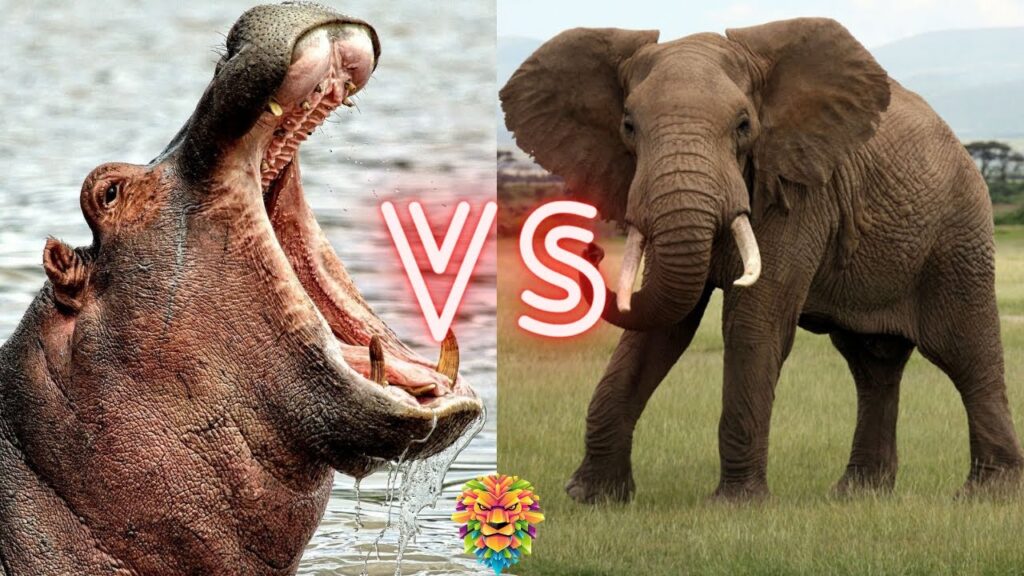
The elephant and the hippopotamus are two of the largest and most formidable animals in Africa, each with unique adaptations that make them powerful in their own right. While both animals are herbivorous and share some habitats, they exhibit vastly different behaviors, physical characteristics, and social structures. This article will explore the differences between elephants and hippos, analyze their strengths and weaknesses, and ultimately assess who would win in a hypothetical confrontation.
Overview of Elephants
Elephants are the largest land mammals on Earth, belonging to the family Elephantidae. There are three species: the African bush elephant, the African forest elephant, and the Asian elephant. Known for their intelligence, strong social bonds, and impressive physical capabilities, elephants play a crucial role in their ecosystems.
Physical Characteristics of Elephants
- Size: Adult elephants can reach heights of 10 to 13 feet (3 to 4 meters) at the shoulder.
- Weight: They can weigh between 5,000 to 14,000 pounds (2,268 to 6,350 kg).
- Trunk: Elephants possess a long trunk that serves multiple functions, including feeding, drinking, and social interactions.
- Tusks: These elongated incisors are used for digging, foraging, and defense.
Overview of Hippos
Hippopotamuses (Hippopotamus amphibius) are large semi-aquatic mammals native to sub-Saharan Africa. They are known for their enormous mouths and aggressive behavior. Hippos spend much of their time submerged in water to keep cool under the hot African sun.
Physical Characteristics of Hippos
- Size: Adult hippos can weigh between 3,000 to 8,000 pounds (1,360 to 3,630 kg) and can reach lengths of up to 16 feet (5 meters).
- Weight: They typically weigh between 3,000 to 4,000 pounds (1,360 to 1,814 kg).
- Mouth: Hippos have large mouths that can open up to 150 degrees and contain large canine teeth.
- Skin: Their skin is thick and hairless, providing protection against sunburn and water loss.
Key Differences Between Elephants and Hippos
The following table summarizes the primary differences between elephants and hippos:
| Feature | Elephant | Hippo |
|---|---|---|
| Scientific Classification | Family Elephantidae | Family Hippopotamidae |
| Size | Up to 13 feet tall (4 meters) | Up to 16 feet long (5 meters) |
| Weight | 5,000 – 14,000 pounds (2,268 – 6,350 kg) | 3,000 – 8,000 pounds (1,360 – 3,630 kg) |
| Diet | Herbivore; primarily feeds on vegetation | Herbivore; primarily feeds on grasses |
| Habitat | Grasslands, savannas, forests | Rivers, lakes, and swamps |
| Social Structure | Matriarchal herds | Social groups called pods |
| Lifespan | 60 – 70 years | 40 – 50 years |
Strengths and Weaknesses
Strengths of Elephants
- Size and Strength: Elephants are incredibly strong due to their size. They can uproot trees and carry heavy loads with their trunks.
- Intelligence: Elephants exhibit high intelligence levels with complex social structures that aid in survival.
- Defense Mechanisms: Their tusks can be used for defense against predators.
Weaknesses of Elephants
- Vulnerability to Predators: While adult elephants have few natural enemies due to their size, young calves may be vulnerable to predation by big cats or crocodiles.
- Limited Speed: Although they can run at speeds up to 25 mph (40 km/h), they are not as fast as hippos in water.
Strengths of Hippos
- Aggressive Nature: Hippos are known for their territorial behavior and aggression when protecting their young or territory.
- Powerful Jaws: Their large jaws can crush bones with immense force.
- Semi-Aquatic Adaptations: Hippos are well-adapted for life in water; they can hold their breath underwater for several minutes.
Weaknesses of Hippos
- Size Disadvantage on Land: While hippos are powerful in water, they are less agile on land compared to elephants.
- Limited Endurance: Hippos tire quickly when running on land due to their bulk.
Hypothetical Confrontation Scenarios
To analyze who would win in a confrontation between an elephant and a hippo, we can consider different scenarios:
Scenario 1: Open Arena Matchup
In an open arena where both animals encounter each other without environmental advantages:
- The elephant’s size would give it a significant advantage. With its powerful tusks and trunk, it could defend itself effectively against a hippo’s attacks.
- The hippo may attempt to bite or charge but would likely struggle against the sheer size difference.
Scenario 2: Natural Habitat Encounter
In a natural habitat where both animals reside:
- In water scenarios or near riverbanks where hippos feel comfortable defending territory:
- The hippo may have an advantage due to its aggressive nature in water. It could potentially ambush an elephant if it gets too close.
However:
- An adult elephant would still pose a formidable challenge due to its defensive capabilities even in the water.
Scenario 3: Bloodlusted Encounter
In a scenario where both animals are bloodlusted:
- The elephant’s overwhelming size would likely dominate. The hippo might inflict some damage initially but would struggle against the massive force of an enraged elephant.
Conclusion
In conclusion, while both elephants and hippos are large and powerful creatures in their own right, an adult elephant would overwhelmingly win in a direct confrontation against a hippo due to its size, strength, and defensive capabilities.Hippos possess remarkable aggression and powerful jaws that make them effective defenders of their territory; however, they simply cannot compete with the sheer mass and power of an elephant.Ultimately, this analysis highlights not only the physical differences between these two magnificent species but also emphasizes their unique roles in their ecosystems. Elephants serve as keystone species that help maintain ecological balance through their feeding habits while hippos play crucial roles as apex herbivores within aquatic environments. Understanding these dynamics enriches our appreciation for wildlife conservation efforts aimed at protecting these incredible animals from threats such as habitat loss and poaching.





